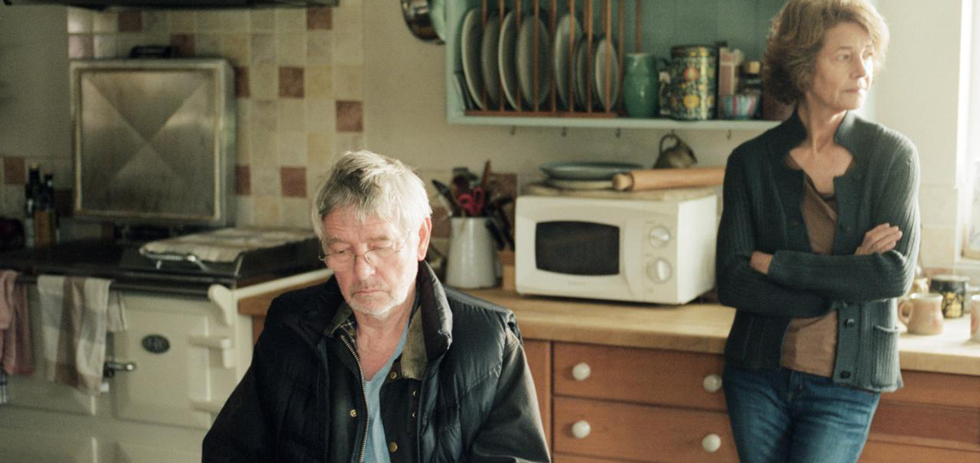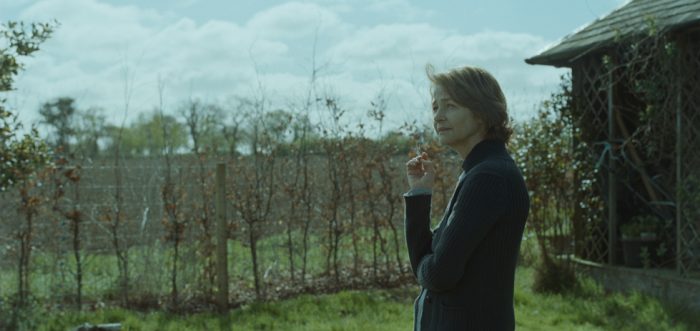
Kate (Charlotte Rampling) and Geoff (Tom Courtenay), a married couple from Norfolk, are about to celebrate their 45th wedding anniversary. Geoff was sick for the 40th. They have no children, but they do have a dog. In the first few moments of the film, as the camera lingers on Kate drinking a glass of water, Geoff reads a letter from Swedish authorities. This letter tells him that the body of his old ex-girlfriend, Katya, has been uncovered under ice; she died 50 years ago on a hiking trip with Geoff. It’s a topic Kate and Geoff have only spoken about briefly before. Now, though, we watch as the couple finally reckons with the tragedy. In this vein, the film tracks the way in which memories, insecurities and what could have beens can haunt us our whole lives.
45 Years is the latest film from Andrew Haigh, of HBO’s recently cancelled Looking. Before that, Haigh made his feature debut with the 2011 gay drama Weekend, a critically acclaimed and much beloved masterpiece of modern queer cinema. Like that film, 45 Years belongs to the same constricted emotional and temporal terrain. Both follow two people, up close. In Weekend, two strangers meet and fall in love over a single weekend. But here, we watch a marriage rocked by the past, a 45-year long relationship dissected over less than a week. The film’s short timeline is anchored around the lead up to their anniversary party. The passing of time is marked by intertitles; each day Geoff gets further lost in his past, in the impossible possibility of a different future with Katya, and Kate finds herself wounded by Katya’s renewed relevance in their life.
The emotionality of both films is subdued, but itching to break out at any moment. This is what Haigh does best, it seems to be his signature. He refrains from overly melodramatic moments, with everything on show. Instead emotion is pushed down and being held at bay. In Weekend this serves the purpose of realism; people in real life don’t necessarily yell and scream and cry on the third date. But here, in Norfolk, it serves to create an air of unease. Kate never really breaks. It builds towards a moment, a potential argument or revelation, but the tension hangs there. By not giving us some semblance of release, Haigh keeps us enthralled but uncomfortable. It’s in this element of the film – the sustained discomfort – that makes 45 Years something of a domesticated horror film. It doesn’t feel relentless, though; Haigh’s script cleverly balances this underlying tension with humour.
Banal moments, like walking the dog, having a smoke or drinking a glass of water are held by the camera for an uncomfortable amount of time. The film is made up of domestic moments like these, and little else. Credit is due to the film’s editor, Jonathan Alberts, for allowing these moments to linger. The action exists in their house, in town, in the car. The action exists in conversational mannerisms: glances held or faces turned away, as much as in dialogue. It’s a strong case for a narrowed narrative scope; the sheer amount of emotional that can be explored in such a small story. Haigh takes familiar relationships placed in familiar environments (a married couple in the English countryside is almost clichéd on its face) and slowly undermines them. The relationship between Geoff and Kate is so crucially set up, so lovingly crafted, that it matters to us deeply when the past has come to disturb it.

The film is based on a short story, David Constantine’s In Another Country. In this form, the narrative is told from Geoff’s perspective – a man finding out his ex-lover’s body had been found. But Haigh chooses to shift the focus, positioning the story from Kate’s point of view. By choosing to emphasise the effect this discovery would have on her the film is all the more heartbreaking. Kate complains that she feels like she has always been able to smell Katya’s perfume in corners of the house: the young love who dies tragically, always idealised, perfectly preserved. It’s heartbreaking to watch and its potency rests almost entirely on Rampling’s face. There are several shots of Kate walking down the high street, where only she is in focus, she is the only thing you can see. Haigh knits together moment after moment of Kate managing, dealing, trying to make sense of what has happened and make sense of her life. In these moments as much as throughout, Rampling is extraordinary.1 She carries the story on her face and it is utterly devastating.
Courtenay, too, is heartbreaking as Geoff. It was always a possibility that we would grow to dislike Geoff, that we would blame him for the effect his past would have on their marriage. But Courtenay is so charming, getting upset about his old communist friends taking up golfing or making eggs for Kate, that we feel for him in all of this, too. It is a testament to Haigh’s direction that we are so generous with the characters, that our points of identification are so strong. It’s this, the fact that we care so deeply about the couple, that allows us to withstand the duration of watching them struggle with the past. The film sets up their anniversary party as the arena in which things will be resolved, but, as in life, things are much more complicated than that.
Around the Staff
| Felix Hubble | |
